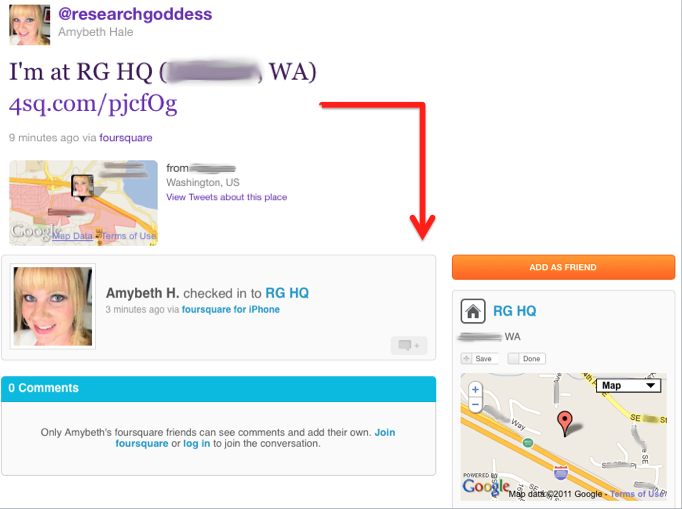I’m a fan of appropriate use of Foursquare. That means not connecting with people whom you wouldn’t be at least a little excited to entertain at your house at some point in time. Back when LBS’s started becoming the latest thing (within the last couple of years), lots of people expressed concerns over privacy issues with checking in at home or potentially opening themselves up to cyberstalking.
Argument aside that 1) these are opt-in services and no one is being forced to download them, register, and check in everywhere, and 2) you shouldn’t connect with people whom you don’t know thus allowing them to track your every move in the first place, I can see some of the issues with privacy, particularly when it comes to those who are confident enough in their connections to check in at home, at their kids’ schools, and so forth.
Earlier this week, Foursquare made some positive changes to its platform by adding a layer of privacy to home check-ins. According to its support forum:
Many users like to check in to their homes on foursquare!
To make sure your home venue is private to you and your friends, choose Home as the venue’s primary category. Doing this will ensure that only you and your friends can see the address on the venue page; everyone else sees a zoomed out map with no map pin (rather than the real location). If a Mayorship, badge unlock, or check-in is shared to Twitter or Facebook, the venue URL will include a map without a specific location for everyone.
Once you’ve created your home as a venue and categorized it as Home, you’ll also have the option to edit or delete it by going to its venue page at foursquare.com and clicking “Edit Venue.”
The actual privacy of this, however, is questionable — as I discovered when I experimented with my own first home check-in.
For starters, I have to say that I think Foursquare has some interesting sourcing applications. For example, by using a search such as site:twitter.com (4sq.com “I’m at”) and adding any keywords you’d like, you can get results of people checking in to whatever venue you’re interested in and tweet at them (yeah, it can be a little creepy). Or you can see who is becoming mayor of various venues (mayors are often people who work at those places… hint hint).
Either way, from a sourcing standpoint Foursquare can be cool if you know how to use it properly and have time to set up the searches. And — you don’t have to be directly connected to individuals in order to find them (see above examples). Which means you can use Foursquare for sourcing if you want without sacrificing your privacy in the process.
For those who are concerned with the privacy implications, this news should sound good. The problem is… it really doesn’t fix things if you’re not being smart about your use of Foursquare in the first place.
I decided to test out this “privacy” myself. I never check in at home — I just think it’s a silly practice. But according to Foursquare, I can now check in at my home without people being able to see the address. So I added my home with address to Foursquare and checked in earlier. Here’s what happened when I did so:

In case you’re wondering, this venue no longer exists… I deleted it after seeing this. I logged out of my account to check out the view for someone with whom I’m not connected or who isn’t logged in. There is still a blatant marker for where my home is — on Foursquare itself as well as on the tweet sent out from my check-in. No map pin, huh? That looks like one to me. Honestly — that’s about as ‘private’ as a recruiter handing a hiring manager a resume with a first and last name on it — but no contact information, you know, to keep it ‘confidential.’ Any good sourcer could take the rest of the information on that resume and, combined with the name, find a way to contact them.
The point I’m making here is this: there is no such thing as privacy when you’re using Internet applications, particularly ones with geolocation services built in. For sourcers — this is generally a good thing because it means that we will have an easier time finding individuals for our job opportunities. But if you’re looking for privacy, then you’re not going to find it here. Sorry!
